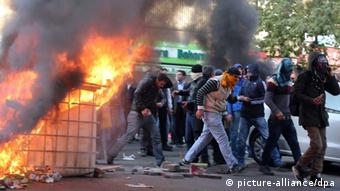The party conference comes only a few days after a deadly bombing in Istanbul killed 10 and injured 15, forcing Turkey to grapple with the ever-present threat of terrorism inside its borders. It also comes at a time when President Recep Tayyip Erdogan is seeking to expand the political powers of the presidency – a move that opposition parties, namely the CHP, are criticizing as insensitive and politically out of touch, given the many threats such as terrorism and the ongoing violence in the southeast.
“The country has turned into a zone of fire. There is a state of emergency in the east, but their only problem is the presidential system,” current Republican People’s Party (CHP) leader Kemal Kiliçdaroglu tweeted, referring to the escalation of violence in the southeastern region of the country after a fragile truce between the Turkish government and the Kurdistan Workers Party (PKK) rebels dissolved over the summer.
“Their personal ambition has blinded their eyes and deafened their ears,” he continued, criticizing the president and the AK Party’s perceived lack of regard toward the escalating humanitarian catastrophe.
Erdogan’s IS ploy
Although Erdogan is credited with instigating peace talks with the PKK in 2013 – leading to a tentative truce in the on-again-off-again conflict spanning more than three decades and claiming the lives of more than 84,000 people – this dissolved in July of last year when, in response to joining the US-led coalition to defeat the “Islamic State” (IS) group, the Turkish army pummeled PKK bases in northern Iraq. While the Turkish government claims that the airstrikes were intended to create a “safe zone” for Syrians fleeing IS, Erdogan’s critics argue that the Turkish government was using the international coalition to fight the extremists as a guise to reignite violence with the Kurdish population.
“At first, people criticized the PKK,” Bilal Sambur, an Ankara-based academic and author, told DW. “However, now they are directing anger toward the AK Party and the president as well.”
While the war escalated well before the November elections, it was those polls – and the landslide Justice and Development Party (AKP) victory – that marked the conflict’s transition from police incursions and arrests of suspected militants in the southeast to a military assault, dispatching military personnel to urban centers, resulting in more traditional urban warfare that included increased clashes and shelling from the government side.
“There are only two ways to solve the conflict,” Aaron Stein, Senior Fellow at the Atlantic Council, told DW. “Either you go back to the peace process, or you try to defeat the PKK and then go back to the peace process, or what is left of it. They chose option B, whereas for the previous two years it has been option A.”
Enormous toll
The escalating violence – including urban warfare tactics – has taken an enormous toll on the civilian population in the southeast. Since the war reignited this summer, tens of thousands of people have been forced to flee their homes, and, while there are no official numbers for the civilian death toll, it is estimated to be well over 100. Those who remain in their homes live under strictly enforced curfews, which, while designed to protect the civilian population, have severely restricted freedom of movement and access to services, allowing security forces opening fire on anyone leaving their homes, and restricting emergency medical care from reaching besieged neighborhoods.
“With my wife, children, mother and other relatives we were all 18 people and were in one room from 6:30 p.m. on the fourth night, to 6 a.m. the following morning,” Bahaeddin Yagarcik, a teacher living in Cizre, one of the most affected cities in the southeast, told Human Rights Watch, describing the impact of the curfews.
“There was no food, and we couldn’t leave the room to go to the toilet,” he continued. “There was no water, and we used an old unused well and lowered a rope down to get the muddy water at the bottom. But it was not drinkable, so we tried to use cloth to filter it. On the seventh day my sister went to get water and was nearly shot.”
‘Looks like Syria’
In addition to the humanitarian impact of the clashes and the curfews, the heightened security measures have been used to justify arrests of Kurdish politicians, activists and journalists, accused of having ties to the Kurdistan Workers Party (PKK). Several politicians in the southeast have been arrested based on statements relating to “self governance” and alleged PKK ties. VICE News journalist Mohammed Rasool was imprisoned for 131 days as a “protective measure” after he was detained in August, filming clashes between the police and youth members of the PKK in the southeastern city of Diyarbakir. Although Rasool has recently been released, 33 journalists remain in prison in Turkey, according to the most recent figures – the vast majority of whom are of Kurdish origin, or working for Kurdish outlets.
“A lot of people are afraid to speak out right now,” an activist, who requested to remain anonymous, told DW. “It looks like Syria in some places and no one is talking about it.”



